#MENDELSSOHN. why
Explore tagged Tumblr posts
Text
the real reason I don’t listen to a lot of classical music is because I’ll inevitably start listening to some Mendelssohn sextet and find myself getting really upset over the fact that I don’t live with more musicians
#not only that but. Mendelssohn. my BOY#had the GALL to arrange it#NOT for string quartet + piano + double bass#NO!!!!#THERE ARE TWO VIOLAS INSTEAD OF TWO VIOLINS#MENDELSSOHN. why#I will never get my roommate to play a viola part which means#I would have to.#do I really want to subject myself to this?
8 notes
·
View notes
Text
Herr Moses, inventor of the "don't like; don't read"
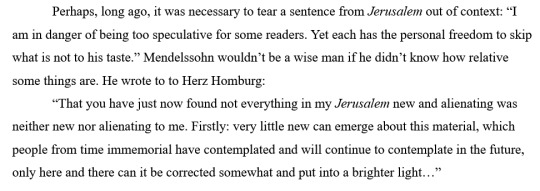
Herr Moses in Berlin, p. 383
#I regret to inform you it's not a fanfiction that he's written this time#but a treatise on why religous tolerance is in fact good#also: if this book is not groundbreaking to you. well. it's not groundbreaking to me either but someone has to say it#moses mendelssohn#mendelssohn#herz homburg#herr moses in berlin#die aufgabe des ausgrabers#heinz knobloch
4 notes
·
View notes
Text
I can't rewatch Rogue One too often because it always makes me absolutely unhinged
#star wars#rogue one#If I think about Bodhi too hard I start crying#It's just on a whole different level than the rest of the movies#Also apparently the reason why Krennic is always wearing his cape is because#Ben Mendelssohn liked it so much he didn't tke it off#Let's not even get started on rebelcaptain#My beloved
21 notes
·
View notes
Text
easily the most annoying thing about beethoven 9 is that the finale really actually is as good as everyone makes it out to be.
#sasha speaks#caught a bit of this one on the radio on the way home tonight#gd damnit. but the finale is so good. why does it have to be so good#the rest of the symphony is honestly just fine. like i think it's still quite good in the scheme of symphonies as a whole#but among beethoven's symphonies i think it's on the mid side#and good lord the grip this stupid piece had on every composer ever for the next hundred years.#i won't say it's a net negative for composition because it objectively is not but some of the Trends it kicked off do annoy me#and that fucking theme. it SHOULD be annoying it SHOULD be boring. it's so simple and trite#it certainly is in the shitmillion covers and quotations and commercial underscores it shows up in#and yet when it's Actually Beethoven. my gd. it's brilliant. it's Glorious#speaks to the man's fantastic grasp of orchestration i suppose#but like. how the fuck does he do it.#the repetition is just like schubert.#tchaikovsky has a broader palette of colors in his orchestrations.#bach or mendelssohn could've written circles around him with counterpoint.#and yet. and YET#it's crap when other people try. but by gd. beethoven makes it work. it's incredible
9 notes
·
View notes
Text
i protest the artificial binary created by radio channels. I don't get why they keep classical music so separate from the rest. imagine if, between Katy Perry and Imagine Dragons, we could suddenly get hit with some banger by Felix Mendelssohn or Vivaldi or the entire full-length Turandot???
2K notes
·
View notes
Text
Here are the creations made by women that men never mention and completely forget: Rosalind Franklin's critical work on the structure of DNA, which was pivotal yet overshadowed by her male counterparts; Ada Lovelace's development of the first computer algorithm, a foundational achievement in computing history; and Hedy Lamarr's invention of frequency-hopping spread spectrum technology, which underpins modern wireless communication. In literature, Mary Shelley's "Frankenstein," a seminal work in the science fiction genre, is often wrongly attributed to her husband. Similarly, the Brontë sisters, writing under male pseudonyms, produced some of the most enduring works in English literature. Fanny Mendelssohn and Clara Schumann, both accomplished composers, had their musical contributions minimized or attributed to their male relatives. These examples show the systematic erasure of women's contributions and creations, taking away the very rich history of female innovation and creativity, which deserve recognition. This is why we should not allow men to undermine women's work, especially given the fact that patriarchy literally stripped away women's rights. Regardless, women continued being innovative.
#radical feminist safe#radblr#men are the problem#women have created a lot throughout history and we should not allow men to deny that#radical feminism#feminism#terfblr
526 notes
·
View notes
Text
The thing with The Greats in classical music is, upon listening to their pieces, you feel why they're The Greats. The music is so high quality it pulls you in more than any composer you've met - and you've met BADASSES. This, this, this, when you hear this, it distinguishes itself as its own class. Almost immediately, you're consumed. On its own, composing music isn't hard. On its own, hearing the works of other colleagues is informative and educational but not intimidating. On its own, personal growth in composing is rewarding and tenable. And you start to think, "Hey, not bad!" But when you sit down and listen to Bach, Mendelssohn, Saint-Saëns, Schubert, Sibelius, Dvořák, Rachmaninoff, in 20 seconds, you're humbled beyond belief. I could not do this. You are small. In a minute: This is art. This is art. This is art. And you're five minutes in, and the brilliance and maturity and nuance and intricacy and variety of ideas and flow and flawless execution, and you think, I REALLY could not do this. Eight minutes in, and it's almost unbearably incredible. And you look over the breadth of their repertoire. And he did it over and over and over and over again, at THIS level. You are nothing, you are dust. It is emotionally overwhelming. You are loomed over by a class of giants. It could be I chords and V chords and IV chords like everyone else, and you're basking at the toe of the tallest Monuments in the world. How could we make these instruments? How could we assemble these sounds? How could we evoke soul so perfectly but so perfectly human? It is good to feel humbled. It is good to bask in this art. We are blessed we live at a time where these pieces have been written and can be enjoyed at the ready. We are blessed to live in a time where we access this much classical music at our finger tips and at our ear drums. We are blessed we can freely - freely, without cost - access scores and recordings. This isn't some perverted idea of elitism. This is grateful awe. Guys, we get to listen to music. We have access to music. What a wonderful world we live in, with talented humans, the endless flowing of ideas, and art that's stood the test of time.
89 notes
·
View notes
Text
Very personal post.
A lot of relationship talk, might make you nauseous.
Oversharing because I felt like it?
Today is our 10-year anniversary of marriage. 10.10 is the date, and 10 years - so many tens. Ten years ago, in a small, very sad-looking building in Donetsk, under the sounds of artillery mixed with the sounds of Mendelssohn's march, which the smiling employee turned on for "special atmosphere," we put our signatures on a piece of paper and kissed, because we were told to. (I would never kiss in public otherwise.) We wanted to get married before all the government structures got captured by the russian terrorists, so that we could still get Ukrainian documents, not just a worthless piece of paper.
We both were wearing t-shirts and jeans. I felt miserable. He was happy. And now, looking back at that day, I'm happy too. In two days, it will also be the anniversary of our relationship - 12 years. We met when we were both 17, at uni. It's crazy how just one person can change your life. I was studying that profession only because of one person. And that's why I met my husband. If not for me, he probably wouldn't have the career he has right now, he wouldn't even be in this field. But if not for him, I literally wouldn't be alive by now.
We make each other better. And we have this "shared brain" where we not only finish each other's sentences, but there is no need for sentences at all. It's like he reads my mind. Sometimes, it's even scary. That's what you get when you lock two kids in a horrible, tiny, moldy apartment and throw some traumatic events at them. It's a bond stronger than we can even understand. We've been living together for almost 12 years, I don't think I can process this number.
People were telling us we were moving too fast. And they were right, it was too fast. We moved in together after two months, only because we wanted to get away from our families. The first two years, we were arguing non-stop over nothing. But it turns out, if you stick around and have patience, everything works out eventually. We haven't had a real fight in years.
What were even the odds of finding someone as asocial as I am, who would love to either stay inside all week or go with me to roam the swamps and valleys? What are the odds of finding a guy who would spend half an hour trying to get the perfect shot of a frog? Yes, these are the main qualities I look for in a man. (just joking... probably) The guy who, during a high tide, would wade over a kilometer of water with me and then swim over 150 meters, following me to the opposite bank just to see what's in there.
He doesn't play the sims or Stardew Valley. Nobody's perfect, I suppose.
69 notes
·
View notes
Text
Days on End
Day 7 of MayPrompts2024
221 words / Prompt: Calm
Sometimes Sherlock doesn’t talk for days on end. John doesn’t mind.
The comfortable clatter of the surgery isn’t exactly stressful, but the constant need to put on a smile when he enters an examination room, to listen as a patient spools out their story at painful length, circling around the real issue— these things are stressful. The give and take with the staff, the constantly ringing telephone— why these should grate on him more than the eerie silence of the Afghan desert or the sudden thunder of artillery fire is a mystery.
He returns home to the flat, and Sherlock is still stretched out as he was when John left hours ago. Noise from the street is remote, muffled. Inside 221B might as well be an undiscovered tomb. It’s peaceful.
“Thai?”
Sherlock hums.
Food arrives; they eat without a word.
There are days when Sherlock paces and grumbles to himself and shouts. He walks across the furniture and throws things that are in his way. A pen goes flying in front of John’s face. A teacup lies broken on the floor. John might be annoyed at the chaos, weary of the clutter, but he’s never bored.
And after these small storms, there is the violin. John falls asleep at night to Tchaikovsky or Mendelssohn, and has no nightmares.
Quiet is bliss.
@lisbeth-kk @keirgreeneyes @totallysilvergirl @ninasnakie @friday411 @raina-at @meetinginsamarra
103 notes
·
View notes
Text
This is gonna be so controversial and I hope no one will come bite my head off because of it but I think you shouldn’t ship the classical composers Mozart and Salieri. Here’s why:
Mozart starts with an M. Salieri starts with an S. These connected is SM which means social media which we all know sucks big balls.
Mozart is a German Austrian. Salieri is an Italian Austrian. These countries are not in the same worldview so they couldn’t even have met: Germany is from Polandball, Italy is from countryhumans, and Austria is from hetalia.
Salieri once pretended he’s a dog and Mozart was a catboy. None of this is in the bible.
Instead, I think you should ship the romantic composers Berlioz and Mendelssohn (and consider themselves romantic to each other). Again here’s why:
Berlioz starts with a B and Mendelssohn starts with an M. These connected can be MB which means Mercedes-Benz or BM as in BMW. A lot of cool cars, as you can see.
Berlioz is French but he has a German ass last name so he’s basically German, and can thus be legally wed to the else German citizen Mendelssohn.
Berlioz smokes pot so he sees God every thirty minutes, and Mendelssohn’s practically Jesus. We all love a good ole god-abiding couple!
Now that you’ve been refreshed and informed, I hope you will be more confident in making the right shipping decisions. Choose the correct path and happiness will follow, happiness will follow anyways, I hope you all have a happy 2025.
#amadeus wolfgang mozart#antonio salieri#mozalieri#felix mendelssohn#hector berlioz#berlix#classical composers#crack post#i'm sorry
19 notes
·
View notes
Text
sorry I lied it's this

One day my two main book interests (the fictional account of a spirited conflict with God or Nature in the material realities of the whaling industry & the devastatingly intimate search for irrecoverable truth in the intimately devastated city) are gonna collide together like the milky way and the andromeda. Probably next semester. And it's gonna be
It's gonna be
HERR MOSES IN BALEEN
#I wonder why Plato's allegory of the underwater guys didn't catch on like the cave one did#phaedo#phädon#plato#socrates#moses Mendelssohn#mendelssohn#Moby Dick#Moby-Dick#Herman Melville#melville#not being on boats#Herr Moses in Berlin
3 notes
·
View notes
Text

okay here's my updated europe map for my reading around the world project. i'm still looking for authors from andorra, cyprus, kosovo, liechtenstein, luxembourg, malta, monaco, san marino, slovakia, slovenia, and switzerland so if you have a recommendation from any of those countries, hmu!
also including my reading list under the cut for anyone interested. keeping in theme with the map, i've read orange books and want to read green books
albania: sworn virgin by elvira dones
austria: little apple by leo perutz
belarus: voices from chernobyl by svetlana alexievich
belgium: will by jeroen olyslaengers
bosnia & herzegovina: catch the rabbit by lana bastašic
bulgaria: everything happens as it does by albena stambolova / to the lake by kapka kassabova
croatia: the ministry of pain by dubravka ugrešić
czechia: mendelssohn is on the roof by jiří weil / lord mord by miloš urban
denmark: a line in the world by dorthe nors / island by siri ranva hjelm jacobsen
estonia: the man who spoke snakish by andrus kivirähk / the willow king by meelis friedenthal
finland: land of snow and ashes by petra rautianinen / my cat yugoslavia by pajtim statovci
france: the lays of marie de france / les miserables by victor hugo
germany: cassandra by christa wolf / tyll by daniel kehlmann
greece: the iliad by homer / why i killed my best friend by amanda michalopoulou
hungary: abigail by magda szabó / the pendragon legand by antal szerb
iceland: miss iceland by auður ava ólafsdóttir
ireland: small things like these by claire keegan
italy: if on a winter's night a traveler by italo calvino / in search of lost books by giorgio van straten
latvia: a woman in amber by agate nesaule / high tide by inga ābele
lithuania: the tears and prayers of fools by gregory kanovich / breathing life into marble by laura sintija cerniauskaite
moldova: set in stone by stela brinzeanu
montenegro: catherine the great and small by olja knežević
netherlands: beyond sleep by willem frederik hermans / the letter for the king by tonke dragt
north macedonia: a spare life by lidija dimkovska
norway: the wreath by sigrid undset / the unseen by roy jacobsen
poland: the books of jacob by olga tokarczuk / swallowing mercury by wioletta greg
portugal: adam and eve in paradise by eça de queiroz
romania: life begins on friday by ioana parvulescu / solenoid by mircea cărtărescu
russia: various classics by tolstoy, dostoevsky, turgenev etc
serbia: inland by téa obreht
spain: such small hands by andrés barba / permafrost by eva baltasar
sweden: the saga of gosta berling by selma lagerlöf
ukraine: odessa stories by isaac babel / grey bees by andrey kurkov
united kingdom: literally just so many books
#lit#reading around the world#some countries have two books because one is the minimum two is just getting a good grade in international lit#gonna post south america next bc 1) i just need paraguay & venezuela 2) every book i've read has been a stone cold banger#since asia & africa have SO MANY countries i've been more focused on finding books than reading them#will still probably post my maps tho#north america and oceania...i'll get there when i get there
19 notes
·
View notes
Text
Fanbinding of The Perfect Song by dragonofdispair
The Perfect Song by dragonofdispair
To follow his dreams, Jazz offers his virginity and himself to anyone willing to pay. His buyer, Prowl, has a lot of loneliness and a kink for virgins, but dreaming isn’t something he’s capable of. Yet.
Fandom: Transformers - All Media Types Rating: Explicit Archive Warnings: Creator Chose Not To Use Archive Warnings Relationship: Jazz/Prowl Characters: Jazz, Prowl, Ricochet, Barricade, First Aid, Sky-Byte
The Perfect Song by dragonofdispair 429 pages, letter-quarto/ 50,061 words
Accompaniment: Companion Pieces to The Perfect Song (Adagio, Coda, Cadenza, and Famous) by dragonofdispair 72 pages, letter-quarto / 4,751 words
The Perfect Song was requested as a bind during our local Renegade Exchange 2024 event. My giftee mentioned they liked quartos and also blue, and so I had the first inklings of a design. My giftee also mentioned they wouldn't mind additional gifts, so I decided to bind the rest of the series as a separate book, mostly because i thought it would look cool and then i would have a reason to make a case too (corral all those books together).
Photos and more discussion under the read-more!
First up is The Perfect Song! I have been wanting to bind a chonky book, and while I didn't reach maximum chonk, The Perfect Song is a respectable size and satisfyingly hefty in the hand. This book is a variation of the bradel binding style, which supports a thicker book well. I ran with the musical theme: the endpapers have musical notations, the text breaks are a treble clef, and I used the written music for Mendelssohn’s Midsummer Night’s Dream as the background image for chapter titles. I chose the font for titles and dropcaps because it reminded me of a musical scale. The blue bookcloth is homemade using a faux-suede fabric: fuzzy texture!
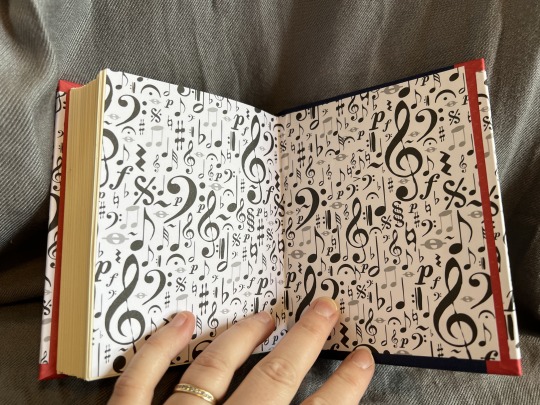
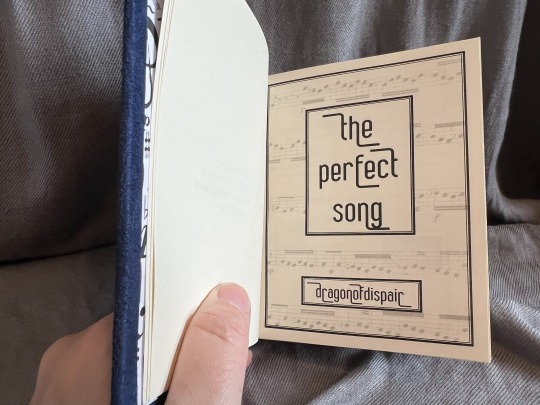
The black and while endbands were meant to invoke a piano keyboard: I'm not quite sure I got there, but they look classy regardless!
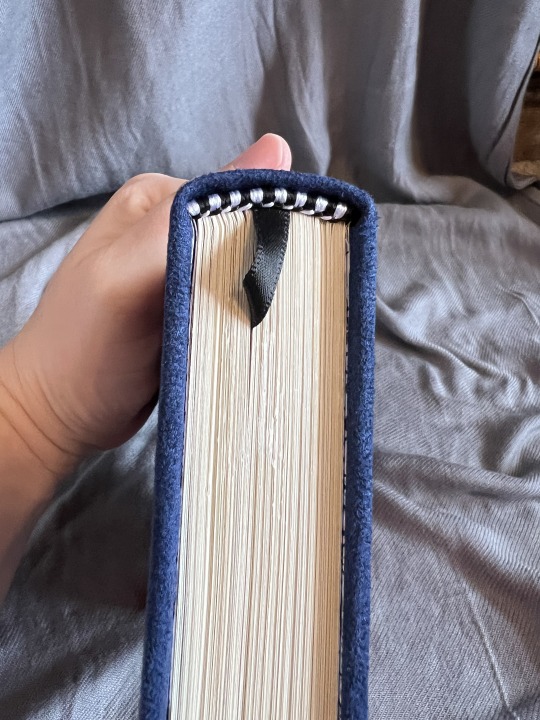
Next is the rest of the series (which I called Accompaniment for the purposes of rounding up the series in a second book), and it uses all the same themes. I like the cohesive look, and really, why mess with a good thing? This is a much slimmer book, bound in a different style from The Perfect Song. This is a modified conservation pamphlet bind.
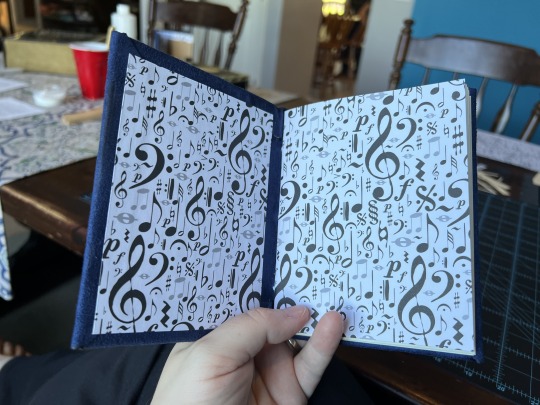
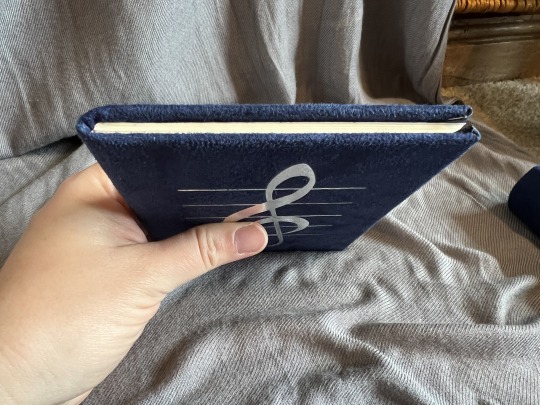
For both books I used HTV to put a treble clef on the cover, and for The Perfect Song I had enough room to title the spine as well.
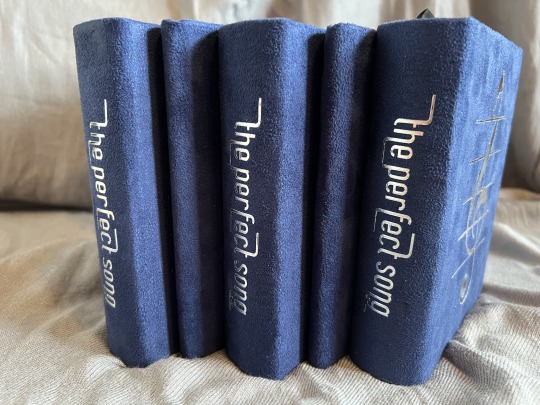
I wanted to make cases for all three sets of books (one for my giftee, one for the author, and one for myself). I ran with the same theme and materials, so nothing surprising there, but I think the books in their cases look really snazzy!
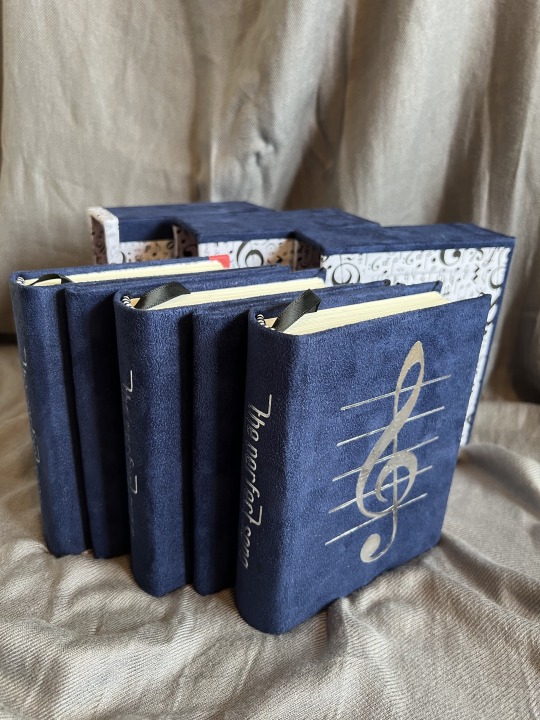
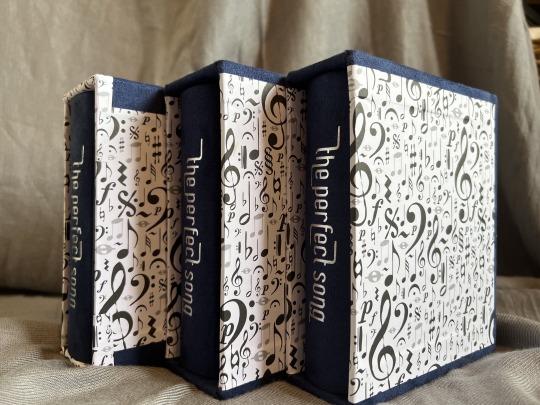
I'm very satisfied with how these books turned out! And I am thrilled to be able to gift a copy to the author! Sharing fandom is wonderful experience for me, and I hope some fanart let's the author know how much I appreciate that they shared their stories.
Also located on A03 here.
59 notes
·
View notes
Text
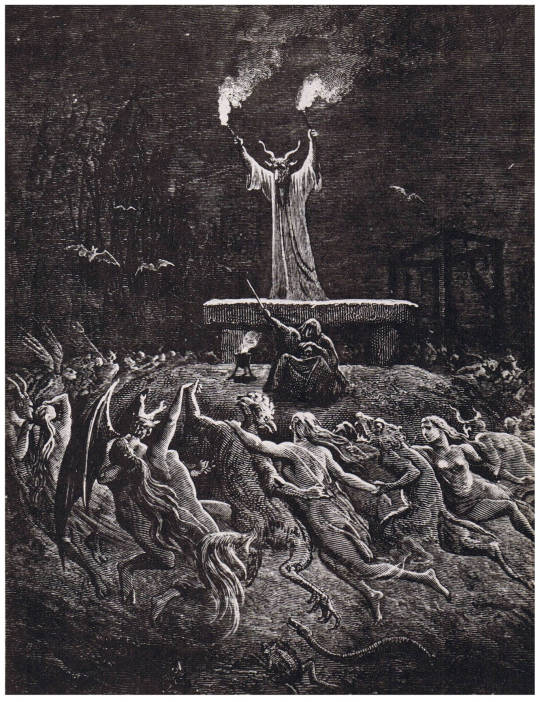
Walpurgis Night. Hexennacht. April 30.
A Short History of the Night of the Witches The origins of the image of Walpurgis night being a witches’ sabbath are unclear. However, it is striking that it coincides with Beltane and maybe other pagan festivals in earlier time. Goethe presumed in one of his poems such an origin.
St. Walpurga For Christians, Walpurgisnacht is also known as the Feast of Saint Walpurga, that is celebrated from the evening of April 30 to the day of May 1st. Saint Walpurga or Walburga was the daughter of St. Richard the Saxon Pilgrim and sister of St. Willibald and St. Winibald. When her father went on a pilgrimage with her two brothers to the Holy Land, he left Walpurga, who was only 11 years old at the time, with the nuns of Wimborne Abbey, where she was educated and learnt how to write.
She traveled in an attempt to bring German pagans to the Christian faith and she also authored Winibald’s biography, which is why she is considered as one of the first female authors in Germany and England. Walpurga became a nun in Heidenheim am Hahnenkamm, the monastery founded by her brother Willibald, where she became the abbess after his death in 751. Walpurga herself died on February 25 on 777 or 779 and she was canonized by Pope Adrian II on May 1st, around 870, when her relics were transfered to Eichstätt, Germany.
St. Walpurga is prayed to for protection against witchcraft and it is believed that during the night of April 30, she is able to ward off spells, witches, and evil spirits. This belief may stem from the overlapping of her canonization with Hexennacht or the Night of the Witches, the celebration that has its origin in ancient fertility celebrations. Hexennacht is a Germanic tradition more prevalent in the 17th century, when witches and sorcerers gathered together celebrate.
To protect against their magic, the Western Christian Church appointed the night of April 30 to St. Walpurga’s Feast. In the 18th and 19th centuries, Walpurgisnacht was popularized and its witchy connotations were revived through the literature of the time, such as in Jacob Grimm’s work who wrote in 1833: “There is a mountain very high and bare… whereon it is given out that witches hold their dance on Walpurgis night”.
Goethe also dedicated a poem to the celebration called “Die erste Walpurgisnacht” (The First Walpurgis Night), which was set to music by Felix Mendelssohn and published as his Opus 60 in 1843. The poem contrasts sharply with the Walpurgisnacht described in his main work “Faust”. In his ballad, Goethe relates the superstitions around Walpurgis night to the usage of devil’s masks by pagan’s in order to exploit the superstitions of their Christian suppressors and to protect their identities.
60 notes
·
View notes
Text
me and my sister in 2018 (classicaloid schubert and beethoven fans respectively): I hate Wagner because he was mean to my boy >:(
me and my sister in 2025 (my sister is now an IRL Mendelssohn fan): Wagner's portrayal in Classicaloid is a genuine affront to western classical music history, humanity and family values, not to mention possibly Richard Wagner the man himself because of how misrepresented he was. The fact that such a character and plotline was allowed to exist is proof that there is no god in this world because what god would let Felix Mendelssohn(IRL), his most faithful child, be betrayed by the man he saved from obscurity as he uses St. Matthew's Passion to coddle Wagner like he's the golden child of the universe? What god would give Wagner every single piece of validation as a son, a brother, a musician, a Classicaloid, at the expense of everyone else including the main characters? What can this character possibly teach about the real Richard Wagner besides just notifying people that Ride of the Valkyries and Die Meistersinger von Nürnberg exist? Why does he get heterochromia when he uses his powers like a 12 year old's first Sonic OC? I hope that goddamn submarine explodes
7 notes
·
View notes
Text

Oh yeez, it happened again and it also happened with THE WORST OLD MEN ugh. So, yeah... Conclave. I rewatched it with my bestie this weekend and why lying, Tedesco was my fav – minus his values ofc. The vape hit and his red sassy cape just made me scream out my religious guilt by thirsting over that mf (i am not a catholic, just for the record).
Also with Andor Season 2 on the horizon, i am pretty sure i will fall back into Star Wars cravings again, not only because Diego Luna as Cassian Andor is making my legs feel like goddamn pudding, no... KRENNIC IS THERE TOO!??!?!?! I hated him at first in Rogue One, but after a few re-watching sessions, i fell for that asshole in his white cape, bc Ben Mendelssohn rocked that role.
No worries, Narcos will keep it's chokehold on me, but my hyperfixated ass will jump in between the fandoms like a kangaroo in a sugar-shock.
So pls prepare yourself for sudden outbursts of creative madness here.
16 notes
·
View notes